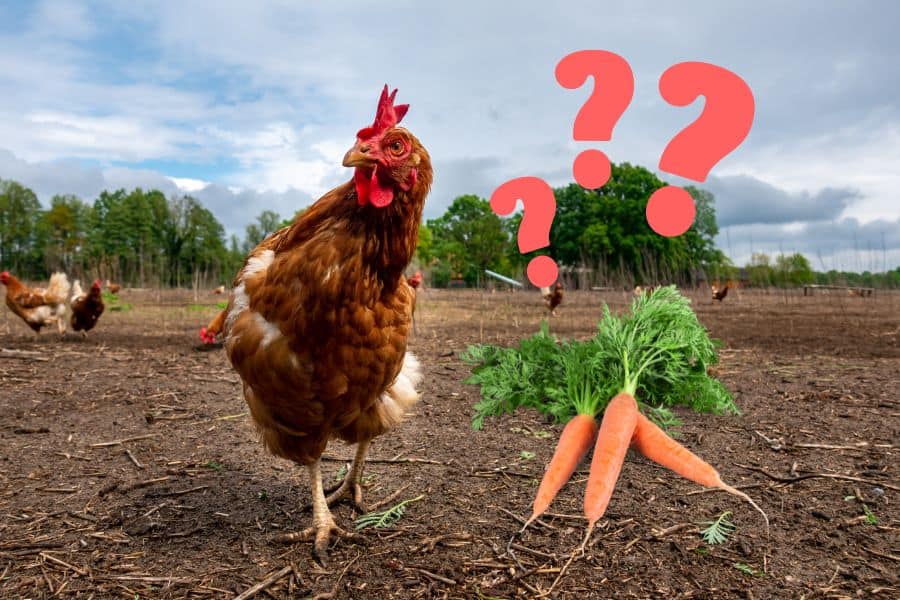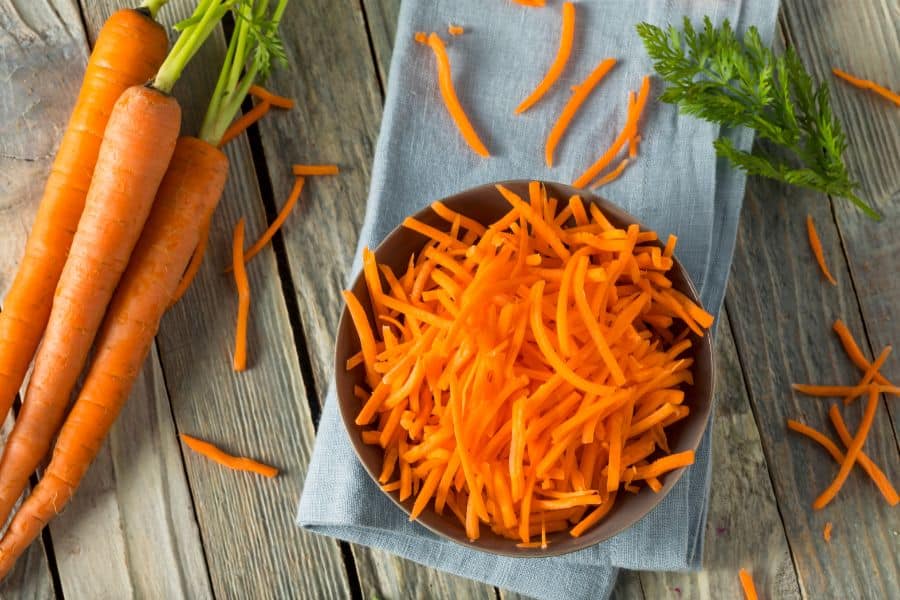Chickens are omnivorous creatures with a wide and varied appetite. Similar to dogs and humans, chickens can eat a wide variety of foods, including proteins, seafood, grains, fruits, and vegetables.
In order for a hen to be healthy, have strong immunity, be vital, and have large eggs, she must be fed a variety of food rich in vitamins.
But that doesn’t mean that every fruit, vegetable, or protein is safe for chickens to eat. If you raise chickens yourself, it is important to know what food is unhealthy or potentially toxic. Some seemingly harmless foods, such as potatoes, could pose a hidden threat to your chickens.

Carrots, on the other hand, are not only safe but also a very beneficial addition to chickens’ food. Your chicken will absolutely love their occasional or regular carrot treat!
What Is in a Carrot?
Carrots are a vegetable full of nutrients.
100 grams of raw carrots contain:
- 41 kcal calories,
- 86 % water,
- 0,9 grams of proteins,
- 2,8 grams of fibers,
- 9,6 grams of carbohydrates,
- 0,2 grams of fat,
- 4,9 grams of sugar.
They are a relatively low-calorie, low-fat snack but contain a moderate amount of fiber. It also has some protein, although not a very large amount.
Of course, we are only looking at nutrition facts here. What about the vitamins and minerals in carrots? Here are the vitamins found in carrots and their benefits for your chickens:
- Vitamin B6 takes part in converting food into usable energy, which keeps your birds active all day.
- Vitamin K1 is crucial for bone health and blood coagulation.
- Vitamin A – Carrots are full of beta carotene, which is converted into vitamin A in your chickens’ bodies.
- Biotin is a vitamin necessary for protein and fat metabolism. It also enhances skin, bone, and feather health.
- Potassium is a vital mineral that helps regulate blood pressure
- Glutathione is an important antioxidant that helps with liver health.
Are Carrots Good for Chickens?
Absolutely! Carrots are a very tasty snack and pose no health risks for your chickens if given in moderation. Moreover, there are many benefits they can provide when included in your chickens’ diet. Let’s see what these benefits are!
Carrots Improve Chickens’ Digestion
Carrots contain a considerable amount of fiber essential for chicken. Insoluble fiber, including cellulose, hemicellulose, and lignin, cannot be digested and plays a significant role in your chickens’ health. This can make your chickens’ stools more regular, reducing constipation and ensuring your chickens have a healthy gut and digestive tract.
Carrots Improve the Quality of Chickens’ Feathers
Feeding your chicken with the right amount of carrots and providing them with vitamins A and C, antioxidants, potassium, and carotenoids can help quicker development and improve the quality of the feathers.
It also maintains gut health by feeding beneficial gut bacteria. Overall, this leads to improved digestion and better health and lowers the risk of many diseases.
Carrots Lower Blood Sugar Level
Carrots contain a soluble fiber known as pectin. This can help lower blood sugar levels by slowing the body’s absorption of sugar and starch.
Carrots Keep Chickens Hydrated
Carrots are a great source of water. A single carrot can contain up to 90 % of water and can play a significant role in keeping your chickens hydrated. It’s especially important during the summer when chances of dehydration are increased.
Carrots Improve Chickens’ Eyesight
Vitamin A, due to its beta-carotene content, is essential for better eye health. Lack of vitamin A may result in nighttime blindness. Taking part in normal chemical activities in chickens’ body it contributes to effective eyesight.
Carrots Improve Chickens’ Immunity
Vitamin A in carrots helps enforce the immune system of chickens. It also protects chickens from different infectious diseases by enhancing the body’s immunity.
Carrots Keep Chickens’ Livers Healthy
Carrots contain high levels of the antioxidant Glutathione. It helps to repair a liver with oxidative damage. Additionally, Beta carotene and flavonoids found in carrots support and enhance the general activity of the liver.
Carrots Make Chickens’ Bones Stronger
Vitamin A in carrots is associated with enhancing chicken bone health. It promotes bone cell metabolism and makes their bones healthy and strong.
Do Chickens Like Carrots?
Chickens absolutely adore carrots! Because of their flavor and nutritional value, carrots are one of the best snacks you could give your feathered friends. Each and every part of a carrot is a sweet and tasty treat for chickens.
However, if you give too much and too often, they might become too fond of carrots, preventing your chickens from eating regular food. For this reason, you should offer carrots to your chickens only as a treat and not as an integral part of their diet.
Can Chickens Eat Carrot Peels?
The carrot peel is perfectly safe for your chickens if you haven’t treated your garden carrots with pesticides or herbicides. Since it is thin and easy to peck at, your chickens will gladly eat it.
However, carrot peels rot fast, so you should not leave the rest on the ground when the chickens are done eating. Also, remember that carrot peels should not be more than 10% of their nutrition.
Can Chickens Eat Raw Carrots?
Chickens can eat raw carrots! But before giving raw carrots to your chickens, you should wash them well. They are often covered in dirt and chemicals when you get them, and you don’t want your chickens to eat harmful chemicals when trying to give them a healthy treat.
By feeding chickens raw, fresh carrots, you can retain all the nutrients lost in cooking. Still, carrots are hard root vegetables and can be difficult for chickens to peck at.
You can solve this issue by cutting them into smaller pieces so that chickens can pick them from the ground, or you can place them inside a feeder.
Once you do, your backyard chickens will adore their new healthy treat.
If you prefer to avoid cutting them into smaller pieces, another option is hanging raw carrots. Carve a hole through several carrots and string them up together like a garland. Hang the carrots up around the yard, on branches, or other similar structures.
This is a great way to keep your chickens active, busy, and entertained throughout the day. Moreover, extra exercise has always been a good idea for a flock.
Can Chickens Eat Cooked Carrots?
Chickens are not too picky in the first place, so they won’t complain, no matter what carrot you offer them! But seriously, you can serve carrots to your chickens any way you like. They are safe for chickens if they are completely raw or cooked.
By cooking, steaming, or roasting carrots, you make them softer and smoother for your chickens’ digestive tract. Just like raw carrots, you can feed them to chickens whole or cut them into pieces.
However, cooking carrots kill some of their nutrients, so feeding cooked carrots to your chickens may not provide as many beneficial nutrients as raw carrots.
Remember, if overcooked and too soft, carrots may be a choking hazard. Also, be aware of the fact that too much moist food can cause watery stool.
Can Baby Chicks Eat Carrots?
Proper nutrition and feeding of chickens are important for breeding advanced and healthy individuals.
For baby chicks to grow quickly and make good use of food, they must be fed with mixtures that contain all the necessary ingredients such as energy, protein, amino acids, fatty acids, vitamins, minerals, microelements, etc.
Chicken starters usually cover all the nutritional requirements of chicks until they are 12 weeks old. However, an additional quantity of vitamins, minerals, and antioxidants that can be found in carrots but is not there in the chicken starter is more than welcome.
You can start feeding carrots to your baby chicks when they are two to three weeks. However, baby chicks’ beaks are not developed at this stage, so carrots need to be cooked and grated first.
Although carrots may not supply a lot of energy, they will certainly provide essential vitamins, minerals, and antioxidants. Vitamin A from carrots is especially important because it aids growth and strengthens the hicks’ bones. Keep in mind that carrots can only be a treat and a supplement to your chicks’ regular diet.
Can Chickens Eat Carrot Tops?
Carrot green tops are nutritious, delicious, healthy for your chickens, and perfectly safe. They are a bit bitter but contain significantly high levels of essential nutrients. Stems and leaves are soft and easy to consume, so the chickens will probably eat them first when given a whole carrot. Pecking through the tops will keep the flock busy and, at the same time, will feed them a nutritious treat.
To protect them from possibly harmful substances, such as herbicides and biocides, that could be on the greens. You should wash them before giving them to chickens.
Chopping the greens before feeding them to the chickens may be a good idea, for it will make them easier to eat.
How To Feed Carrots To Chickens?
You can serve carrots, carrot peels, and greens to your chickens any way you like. You can feed them whole, grated or chopped, steamed, cooked, or raw. You can slice or shred them and serve them to your chickens. You can even prepare a carrot smoothy.
As mentioned earlier, carrots should only be given as a supplement to high-quality chicken feed, which is the primary component of their diet.
Along with other vegetables and fruits necessary for keeping your chicken’s good health, carrots should make up a maximum of 10 to 20% of their caloric intake.
Feeding your flok with half-average-sized carrots up to 3 times a week will be more than a sufficient supplement to their regular diet.
Related:
- Can Chickens Eat Cucumbers?
- Can Chickens Eat Kale?
- Can Chickens Eat Rice
- Can Chickens Eat Onions?
- Can Chickens Safely Eat Mushrooms?
- Can Chickens Eat Meat?
Conclusion
So, can chickens eat carrots?
The short answer is an absolute yes! Carrots are not only a delicious treat for chickens, but they are also healthy and can provide some nutritional benefits to chickens. This snack is low in fat and contains a decent amount of fiber.
In addition, carrots are packed with vital nutrients like beta-carotene, potassium, and Glutathione. But remember, carrots are only a treat and should not be a staple part of your chickens’ diet.

